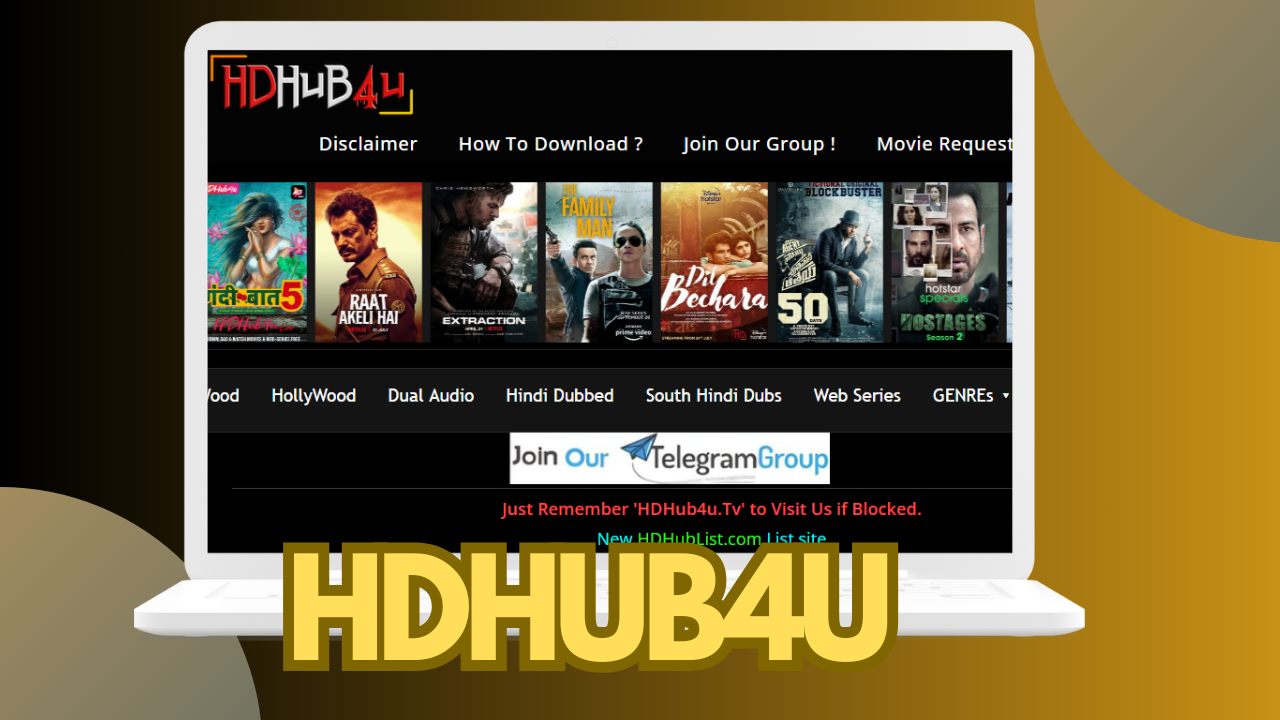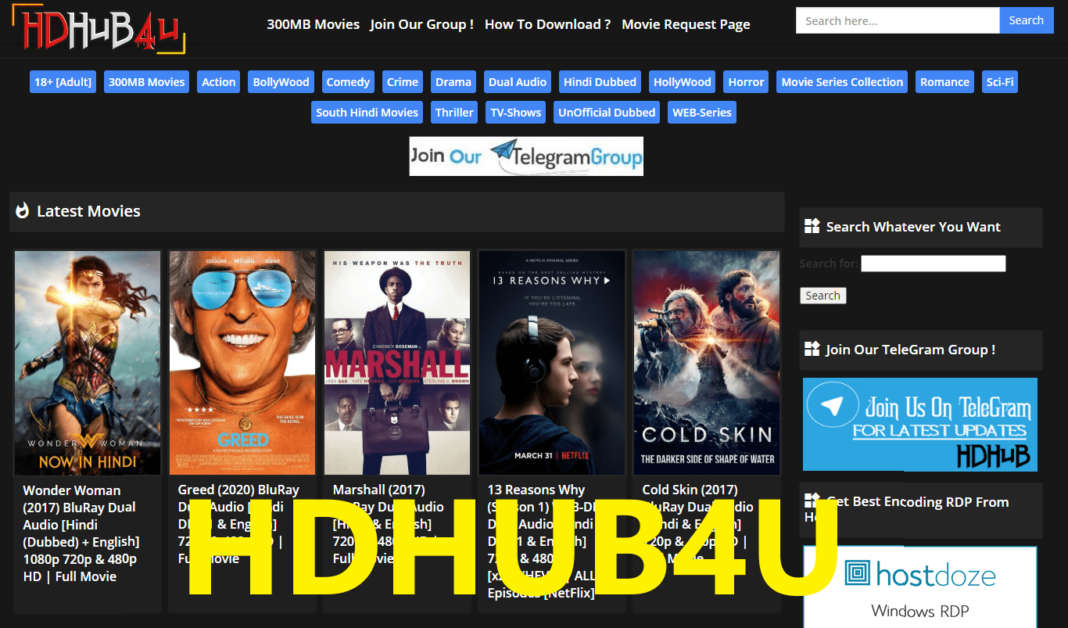Latest Movies On HDHub4u Web - Watch Now!
Is the digital landscape offering a sanctuary for cinematic enthusiasts, or is it a treacherous labyrinth of copyright infringement? The proliferation of websites like "hdhub4u web" has sparked a contentious debate, forcing us to confront the complex interplay between the allure of free access and the ethical, legal, and artistic ramifications of online piracy.
For many, the appeal is undeniable. The promise of instant access to a vast library of films and television shows, often without the financial burden of subscription services or individual purchases, is a powerful draw. These platforms frequently host a diverse range of content, spanning genres, languages, and release dates, making them a convenient one-stop shop for entertainment. Users are often drawn to the latest releases, bypassing traditional cinema release windows, and experiencing films in the comfort of their own homes. The convenience extends to the absence of geographical restrictions, allowing viewers to access content that might not be available in their region. However, this accessibility comes at a steep price, both for the creative industries and for the users themselves, who may unknowingly expose themselves to malware and legal repercussions. The "hdhub4u web" model, like many others of its kind, operates in a legal gray area, raising fundamental questions about intellectual property rights and the future of filmmaking.
| Category | Details |
|---|---|
| Name/Alias | (Hypothetical) John Doe (Often operating under pseudonyms) |
| Known Affiliations | Unknown; often associated with offshore entities to evade legal scrutiny. Could be an individual or a small team. |
| Location | Often difficult to ascertain due to the use of VPNs, proxy servers, and offshore hosting. Could be located anywhere with internet access. |
| Website Structure | Typically features a user-friendly interface, organized by genre, release date, and popularity. Often includes a search function and high-quality video players. Content is streamed from various sources, often using sophisticated CDN (Content Delivery Network) technologies to ensure fast and reliable access. |
| Revenue Model | Primarily relies on advertising revenue. May feature intrusive pop-up ads, banner ads, and interstitial ads. Could also employ affiliate marketing or even, in some instances, cryptocurrency mining scripts. |
| Content Sourcing | Obtains content through various means, including ripping from Blu-rays, DVDs, and other sources. They may also utilize direct downloads from other torrent sites or streaming services to capture the content. |
| Legal Challenges | Operates in direct violation of copyright laws. Subject to takedown notices, legal actions, and potential shutdowns by authorities. Often switches domain names and hosting providers to avoid detection. |
| Reference Website (for Information on Copyright Law): | U.S. Copyright Office (Example) |
The "hdhub4u web" model, and similar platforms, rely heavily on the monetization of copyrighted content. The primary revenue stream is advertising. These websites are typically peppered with advertisements, often aggressive and intrusive, including pop-up ads, banner ads, and redirects. The more traffic a website receives, the higher the advertising revenue. This creates a powerful incentive for these sites to attract as many users as possible, regardless of the legal and ethical implications of their activities. The advertisements themselves can be a source of danger. They can be linked to malware, phishing schemes, and other malicious content, posing a significant threat to users' devices and personal data. This underscores the inherent risks associated with using these platforms.
Beyond advertising, some of these websites may employ other monetization strategies, such as the integration of affiliate marketing links, enticing users to purchase products through their referrals. Others may resort to more insidious methods, like embedding cryptocurrency mining scripts that exploit users' computers for computational resources without their knowledge or consent. These practices highlight the often-hidden costs associated with accessing seemingly "free" content. The financial incentives driving these websites often lead to a disregard for the well-being and security of their users. The constant race to generate revenue, combined with the need to evade legal repercussions, frequently leads to a precarious online environment. The operators of these websites prioritize profit, even at the expense of those who use their services.
The ease of access to content on "hdhub4u web" and similar platforms is often facilitated by sophisticated technology. These websites are frequently designed with user-friendly interfaces, making it easy to search for and stream movies and television shows. They invest in fast and reliable video players, often leveraging Content Delivery Networks (CDNs) to ensure smooth playback. The organizational structure, with clear categorization by genre, release date, and popularity, further enhances the user experience. This level of sophistication makes the websites attractive to users, contributing to their wide appeal. The user interface is a key part of their success, as it provides a seamless experience and allows users to quickly find the content they are seeking. The creators of these platforms dedicate significant resources to creating a user-friendly experience that keeps people returning.
The use of VPNs (Virtual Private Networks) and proxy servers is widespread among users of such platforms, allowing them to bypass geographic restrictions and mask their IP addresses, further complicating efforts to track and prosecute copyright infringement. Many users rely on VPNs to protect their privacy and to access content that may be blocked in their regions. Similarly, proxy servers are used to route internet traffic through different servers, further concealing the user's location. This arms race between the users and those who enforce copyright laws illustrates the complexities of fighting online piracy. The sophistication of the technological tools employed by both sides makes it more challenging to address the underlying issues.
The legal battles surrounding websites like "hdhub4u web" are complex and ongoing. These platforms are often subject to takedown notices from copyright holders and legal action from organizations like the Motion Picture Association (MPA) and the Recording Industry Association of America (RIAA). However, the anonymous nature of the operators, their use of offshore hosting, and the frequent switching of domain names make it difficult to prosecute and shut them down permanently. The legal teams representing the entertainment industry constantly fight against these websites, but the battle is ongoing. The legal strategies involve various tactics, including sending cease and desist letters, pursuing lawsuits, and lobbying for stronger legislation to combat online piracy. The challenge lies in enforcing copyright laws in a globalized and rapidly evolving digital landscape. The complex legal landscape is often an obstacle to swift action against copyright infringement.
The ethical considerations extend beyond legal issues. The unauthorized distribution of copyrighted content has a significant impact on the creative industries. It undermines the financial viability of filmmakers, actors, writers, and other professionals involved in the production of movies and television shows. When content is freely available online, the revenue streams that support the creation of new works are diminished. This, in turn, can lead to fewer opportunities for filmmakers, reduced investment in film projects, and a decline in the overall quality of content. The ethical debate surrounding copyright infringement involves questions of fairness, artistic integrity, and the value of creative work. Supporting these websites is a form of stealing from creators and companies that invest in making movies and shows. Without a fair and robust system for protecting intellectual property, the future of the entertainment industry is at risk.
The impact of online piracy is not limited to the film industry. Music, software, video games, and books are also frequently targeted. The widespread availability of pirated content contributes to a culture of disregard for intellectual property rights. It fosters a perception that content should be free, devaluing the creative efforts of artists and creators. This has broader societal consequences, impacting innovation and the willingness of individuals and companies to invest in new creative projects. The consequences of online piracy can be far-reaching, affecting economic growth and the development of new artistic and technological endeavors. The erosion of copyright protections can be a detriment to the creative process and the future of innovation.
The discussion surrounding websites such as "hdhub4u web" highlights the urgent need for alternative solutions. The entertainment industry must work to make content more accessible and affordable for consumers. This can be achieved through a combination of factors, including lower subscription costs, wider availability of content across different platforms, and enhanced user experience. Streaming services have been pivotal, yet ongoing challenges exist in providing adequate content. Innovation in pricing models, such as tiered subscription plans that cater to diverse budgets, could also play a role. Furthermore, combating online piracy requires collaboration between governments, internet service providers, and the entertainment industry. Legislation needs to adapt to the evolving digital landscape to be truly effective. Collaboration among all stakeholders will be essential to safeguarding the rights of copyright holders while providing consumers with access to content they desire.
The responsibility for combating online piracy does not rest solely with the entertainment industry. Consumers have a role to play in supporting legal avenues for accessing content. By choosing to subscribe to legitimate streaming services, purchasing digital copies of films, or supporting cinemas, viewers can contribute to the sustainability of the creative ecosystem. The awareness of the issue is growing. Users who consciously decide to avoid pirated content demonstrate their commitment to fair practices and the future of art. The choice to access content legally is a sign of respect for creators and their work. Promoting media literacy and educating consumers about the ethical and legal implications of copyright infringement can also play a significant role in changing user behavior.
The future of digital content consumption is being shaped by the ongoing battle between copyright holders and those who distribute pirated content. The evolution of technology and the internet will continue to present new challenges. The entertainment industry must adapt its strategies, focusing on innovation, accessibility, and user-friendly experiences. The legal framework needs to remain relevant and effective in enforcing copyright laws. Simultaneously, consumers will need to evolve as well, valuing ethical and sustainable content consumption. The ultimate success in this struggle depends on a collaborative and multifaceted approach. This is the crucial conversation about the future of entertainment.



